When corporate officials use insider information to their personal advantage, they commit a crime. Famous cases involve Michael Milken (junk bond king), Martha Stewart (TV presenter), and Steven A. Cohen (hedge fund manager).
Ever since Michael Douglas played Gordon Gekko in "Wall Street", awareness of insider trading has entered popular culture. Just about everyone knows that frontrunning the market using confidential information can get you straight into prison.
Who would even dare to question it? And why should you – as an investor – care?
This is an article I had wanted to write for the better part of two decades. I like to question seemingly unquestionable narratives, all the more so if there is something to be learned that may lead to new investment ideas.
Here are the arguments for legalising insider trading, and the reasons why this issue may yet come into public debate again.
As a heads-up to my readers: there is no concrete investment recommendation hiding in today's article. It's a more general piece to build a mental framework, provoke discussion, and explore new ways of thinking about where the world is going. Personally, I find this article all the more valuable for this very reason. Anything that hones our intellect in areas that are seldomly discussed will help make you a more confident contrarian and a better investor. But, just to have said it, if you are looking for specific investment ideas, better check back next Friday.
Introducing the godfather of the insider trading debate
The late Prof. Henry G. Manne had a background in both law and economics.
In 1966, he published a book that keeps popping up even in today's scientific literature. "Insider Trading and the Stock Market" became THE landmark publication questioning whether the government was right to ban insider trading.
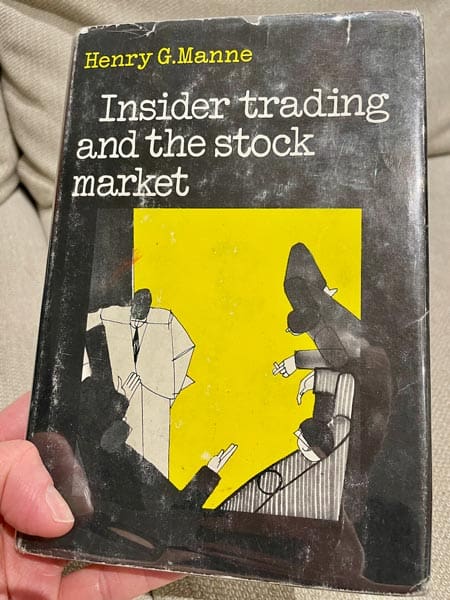
Even back in those days, making this argument left you wide open for criticism. One contemporary book reviewer called Prof. Manne's work "bold", insinuating that it was borderline crazy to go public with such a thesis.
Indeed, even I wondered if I should write about it. Could it backfire if I defended the seemingly indefensible? Why don't I publish an article defending the late Jeffrey Epstein instead?
Intellectual curiosity got the better of me. I had first read Prof. Manne's work in the late 1990s when copies of the book were still cheap. Over the years, I followed how it became scarcer and more expensive. Evidently, SOME people are interested in the thinking process of this 1960s intellectual renegade.
I am also sure that some of you will appreciate looking at a popular subject from an entirely different angle. It's not just a fun exercise, but it might also help guide you towards more lucrative investment ideas a bit further down the road – and legal ones, for that matter.
Last but not least, you will learn why "Insider Trading and the Stock Market" should itself become a good investment. It wouldn't surprise me if this book increased in value by a factor of ten in the years to come. That is, if you are quick enough to buy one of the available copies once this article is out.
How insider trading regulation came about
Insider trading is a complex subject with many nuances, both legally and otherwise. To keep this article to a manageable length, I will simplify some aspects, but also provide some source material for anyone who would like to dig into details.
For the purpose of legality, insider trading is defined as "the trading of a publicly-listed company's stock (and other securities) based on information that is not yet public and which is suitable for moving the stock's price".
The first ban of insider trading was legislated by the US Congress in 1934. Following the stock market crash of 1929, politicians had called for protecting the public against scheming corporate insiders. In the mid-1960s, a high-profile insider trading case at the Texas Gulf Sulphur Company led to tighter regulation. It was at that point that insider trading regulation became what it is today.
One of the arguments used to popularise a regulation of insider trading was to "level the playing field" and "increase the public's confidence in financial markets". Over the years, this point has become the most popular and widely-accepted argument in favour of banning insider trading. The "market confidence" argument says that if investors knew that insider trading was common, they would refuse to invest in such an "unfair" market. As a result, fewer investors would participate in that market, trading liquidity would be reduced, and overall investment would diminish. That's where government has to step in and protect the public's interest and the overall economic and social wellbeing of the nation – right?
It sounds like a valid argument, but there is little in terms of hard evidence to prove it, which was one of Prof. Manne's main points of criticism. Indeed, a check of the scientific literature of the past few decades shows that he was onto something. In 2018, a research paper titled "The Lost History of Insider Trading" by Michael A. Perino dryly concluded:
"… subsequent scholars have similarly pointed to the absence of any direct empirical evidence that the level of insider trading in the market is negatively correlated with stock market participation."
Prof. Manne described the confidence argument as a scare narrative created by government officials and wilfully spread by a naïve media. Even just a sense check indicates that he was probably onto something. If knowledge of widespread insider trading did keep investors from participating in markets, why did a record number of Americans rush into the stock market during the 1980s? At the time, everyone knew that the practice was rampant.
In the US, it is the Securities and Exchange Commission (SEC) that is tasked with enforcing insider trading regulation. To this day, the SEC keeps claiming that policing insider trading is "central to the Commission's mission of ensuring confidence in the markets".
One side of the argument claims that maintaining market confidence is at the heart of it all.
The other side claims that there is effectively no evidence for it.
Who is right, and who is wrong?
There will probably never be a conclusive answer, because proving a negative is famously difficult. The market confidence argument is a nearly unfalsifiable proposition. Might it have been chosen for that very reason?
The authorities did succeed in creating a narrative that prevention of insider trading is part of the moral standards on which society and the business community have agreed. Indeed, moral and ethical business standards have played a substantial and positive role in the development of business. However, is society really best served if these standards are defined and enforced by a government agency? Are there other important aspects that the existing narrative neglects? And could current insider trading regulation hurt your interests as an investor?
The scientific literature of the past few decades provides fascinating alternative viewpoints, some of which have gained way too little attention in public debate.
Some obvious contradictions
If insider trading was such a societal evil, why has it remained legal in just about any area outside of securities markets?
E.g., you can legally use any form of insider trading to make money in real estate. If you happen to know that there is oil underneath the land owned by Farmer Jones, there is no need for you to disclose the information and you can try to snatch the land on the cheap. Real estate is the world's largest asset class. If insider trading was economically damaging, why is it entirely legal in this important investment market? Has it kept investors from participating in the real estate market?
Participating in markets because you have access to superior information is the point for participating at all. Buyers of art, cattle and professional football players routinely profit from knowledge that most sellers do not possess, and a few sellers profit from knowledge that most buyers do not possess. Hardly anyone ever casts aspersions on such traders' ethics or contends that these transactions should be regulated to make them "fair".
The closer you look at the subject, the more cracks and holes you find in the commonly accepted idea that all insider trading on the stock market has got to be illegal. You also start to realise that insider trading regulation was primarily created by lawyers and politicians, rather than by economists or investors.
Case in point, the entire idea that ordinary investors always lose out if insider trading was allowed.
Take the example of a company that has achieved a major win. There can be significant delays between a positive corporate event and the company being able to disclose it to the public. E.g., a minerals company might have struck a gold vein so big that the engineers and executives on the ground will have noticed immediately, but it's not able to announce it publicly until all the technical reports are finalised, which could take weeks. When insiders are banned from trading, the price of a stock will remain at the present level until the event is announced. If you happen to own the stock but decide to sell during this period, you are worse off than if insiders had been allowed to engage in informed trading, which would have driven up the stock price earlier. This is ironic, because it is precisely the "selling outsiders" that authorities have always claimed were most harmed by insiders.
There is a whole body of research about the broad array of scenarios where the general public lose out financially because of insider trading regulation. These cases don't generally get much attention and, instead, naïve media pieces and movies make it appear like it was a clearly settled moral issue. Gordon Gekko probably did for the subject of insider trading what Jaws did for the public thinking of sharks as man-eating killer machines (when in reality they are a vital part of the ecosystem without which ocean life cannot survive). The legislators and regulators have – at least for now – won the war of dominating the narrative, but they have done so on the back of evidence that is primitive and equivocal. You quickly notice as much as soon as you spend a bit of time trawling through the existing literature.
There is another issue with it, and it is as big as a barn door.
If there weren't already many other underlying issues with regulating insider trading, the following one alone could be enough to make a strong case for revisiting the entire subject.
The showstopper argument against insider trading
Even stringent supporters of insider trading regulation admit that it simply cannot be enforced effectively.
Every time there is a new corporate scandal involving insider trading, regulation is upped to another level. The trend towards ever more stringent regulation and supervision has been happening in front of our eyes for decades already. Consequently, you'd expect that, by now, the supervision and prosecution of insider trading had become reasonably effective. However, there is an overwhelming body of scientific work that shows governments are STILL unable to effectively enforce insider trading regulation.
E.g., in 2012, Brendan Lambe asked "Is insider trading regulation effective? Evidence from UK takeover activity". His conclusion was that much insider trading was going on and remained undetected. It matches my own anecdotal observations of spending the last two decades immersed in London's financial industry. One would have to be blind not to notice that insider trading is about as rampant in London as the use of illegal white powders in the toilets of upmarket restaurants. Mind you, we are speaking about one of the world's most advanced and most tightly supervised financial markets. Never mind less-developed jurisdictions. Someone once described the Austrian stock market to me as follows: "In Austria, important corporate news always seems to be in the market two or three days before the companies disclose it." And that's before we have even started to look at developing countries and pioneer markets.
Obviously, enforcing insider trading gets a lot of public attention whenever the authorities net a big fish. No bigger fish they netted in the past 20 years than the billionairess media personality, Martha Stewart, who in 2004 even went to jail over her use of privileged information. Her case made for sexy headlines and the biggest insider-trading story since the 1980s, but none of it stopped the practice from going on.
If you are looking for a gripping read about one of the biggest insider trading cases of recent memory, get a copy of "Black Edge: Inside Information, Dirty Money, and the Quest to Bring Down the Most Wanted Man on Wall Street". It features hedge fund billionaire Steve A. Cohen, who was suspected of using insider information on an industrial scale. In the end, he paid a USD 1.8bn (!) fine - pocket change to him.
Critics point out that prosecuting insider trading was mainly a matter for bluster and headlines, which would be used to hide the extraordinarily low enforcement capability. The main problem with enforcing insider trading is related to the nature of the good which the government attempts to control: information.
There are no physical barriers that prevent information from flowing and circulating. The further information flows through a network, the more difficult it is for prosecutors to reliably prove its original source. Never mind cases in which insider trading takes a passive form, i.e. a decision to keep a security rather than sell it. There are so many variations of ways to evade the regulation that most insider cases require the authorities to find a "smoking gun" in the form of notes or recorded phone conversations. Needless to say, ever since we saw Gordon Gekko arrested on the big screen following a wire-tapping operation, the entire finance world knows that if you wanted to avoid getting caught, you must avoid leaving any traces.
Alexandre Padilla, a Professor of Economics at the Metropolitan State College of Denver, came to a clear-cut conclusion in his research paper "Can Regulation of Insider Trading Be Effective?":
"Our analysis shows that it is in theory and practice impossible for insider trading regulation to be effective."
In my mind and having done more reading on this subject than would generally be considered a good use of time, it's not unreasonable to say that prosecuting insider trading is capricious, political, and extremely inefficient.
Prof. Manne concluded as much in a 2005 update he published about his work, an article in the Journal of Corporation Law titled "Insider Trading: Hayek, Virtual Markets, and the Dog that Did Not Bark". The late professor was quite self-reflective and also used this article to admit that some of his 1966 theses needed revisiting. However, he didn't change his mind about the issue of enforcement. As he put it ten years before his death, "SEC enforcement of its rules is a mess."
If a law cannot be enforced without excessive arbitrariness, is it a good law?
Is it moral to make Joe Public believe the market is fair, when in reality, it's not?
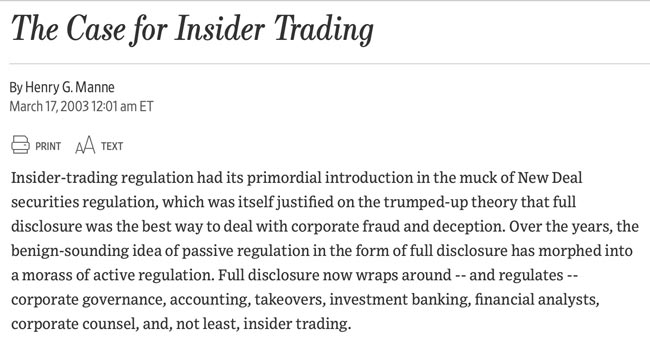
In his 2003 op-ed for the Wall Street Journal, the late Prof. Manne provided a quick overview of key issues.
A complex, nuanced issue
As you will have probably realised by now, at the very least the entire issue of insider trading is less of a clear-cut image than many would like you to believe. None of which is to say that insider trading regulation didn't succeed in SOME ways. Aspects of it do improve investor confidence and increase market liquidity. Each side of the debate can generate plausible scenarios to bolster its position.
An open-minded observer who attempts to look at the evidence objectively will likely conclude that banning all insider trading was wrong, just as much as it would be wrong not to legalise some of it.
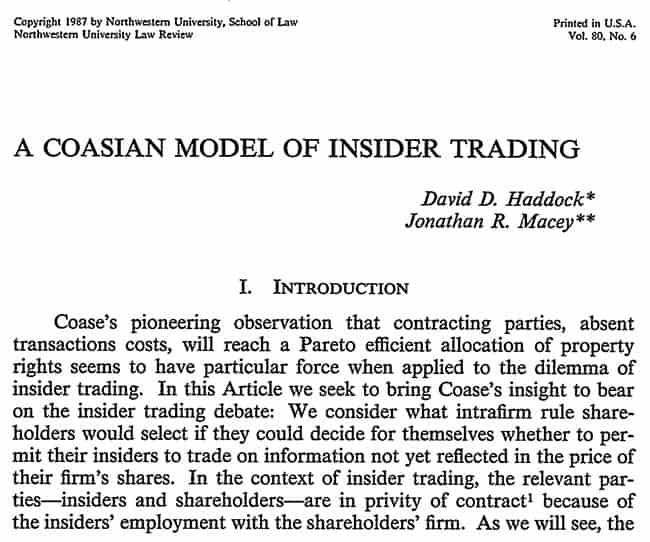
This 24-page report from 1987 continues to provide one of the most captivating reads about the ins and outs of the insider trading argument (source: Digitalcommons Yale University)
It does seem to bear a resemblance of the so-called "war on drugs", another area where governments put in place a blanket ban based on the argument of having to protect society. Medical marijuana was made just as illegal as heroin, enforcement never kept up with the alleged crime, and the profit margins for those who did engage in the practice only went up as a result. I grew up at a time when teachers at high schools acted as the missionaries who evangelised about the eternal wisdom of "Just say No to drugs", and when questioning any of this would have made you a social outcast. Fast-forward a decade or two, and it all looks a bit silly in retrospective. Fortunes have recently been made building drug-related companies, which appeared unthinkable not too long ago.
Is it time to revisit insider trading, too?
Surprisingly, there is one jurisdiction where insider trading in financial instruments – of a particular kind and under particular circumstances – is legal despite significant outside criticism.
At the risk of overstraining the comparison with the war on drugs, it did make me wonder if financial markets and insider trading regulation are currently seeing the equivalent of the first jurisdiction legalising the use of medical marijuana.
Is that a valid way of looking at it?
What other changes may be to come in the future?
I wanted to investigate if any of this will have direct relevance for at least some investors, and whether it can provide opportunities for younger people, in particular.
Was all this regulation entirely unnecessary in the first place?
If some insider trading is beneficial for market participants – as we have seen above – then the question is, why was it made illegal in the first place?
Indeed, there is a lot that the law-creating authorities have to answer for. One obvious flaw in the current regulation of insider trading is that you cannot opt out.
Why shouldn't companies and investors be able to say: "We get all that, but we simply don't need this form of protection and we don't want to deal with the additional bureaucracy. We may even allow our executive staff to engage in insider trading as an additional form of executive compensation and to make our share price reflect the underlying enterprise value more quickly and more efficiently – it's just what our investors are asking for."
There is a case to be made for leaving everyone to decide if they want insiders to comply with any form of insider trading regulation, or not. The tools to do so have always been available, and certainly long before Washington, DC, started to get involved in the subject in the 1930s. Much of what insider trading regulation was supposed to deal with, had actually long been dealt with through the common law that is applied throughout much of the English-speaking world.
Everyone agrees that fraud, deceit and other criminality need to be prosecuted. However, these instances are already regulated by existing law. A director who misleads shareholders commits a crime under common law. When board members use privileged information about their company's intent to launch a bid for another company, they enrich themselves at the expense of their employer which constitutes theft. A lawyer or banker who uses his knowledge about a client company's unannounced merger for personal gain is stealing. They take what belongs to someone else — information, trade secrets. The tools for prosecuting these instances have been in place for centuries.
Companies that feel the need to protect their investors against insider trading can simply require their directors, employees and shareholders to voluntarily commit to a standardised way of treating insider information. There'd be no need for the government to get involved over and above the provision of its three branches for cases when citizens flag disputed cases.
Instead, a government agency was set up to create what we now know is a mere illusion of levelling the playing field. What insider trading regulation has led to instead is a cumbersome set of corporate governance that slows down markets and delays efficient pricing, burdens companies and their owners with additional costs, and misleads the public by making them believe in a fairness that doesn't exist in the way the protagonists claim.
This is what someone like Prof. Manne has argued for decades, and it makes for a strong case.
Many do benefit if the owners of privileged information are allowed to freely use it to their advantage. This use of information helps the price of an asset to move to its "correct" level more quickly. If an insider purchases stock based on their inside information, it disadvantages the 1% who sell to the insider at too low a price, but it benefits the other 99% who see the price of their asset move to its correct, higher price more quickly.
Does a vague concept of "fairness" justify placing such a huge burden on everyone? Was this an early example of today's widespread societal disease of special interest groups and aggressive minorities gaining unreasonable protection at the expense of everyone else?
The question that has to be answered is whether outlawing all insider trading was the most appropriate action for dealing with the few cases of undesirable conduct. Traditional modes of administrative conduct and criminal law enforcement would have probably been more appropriate, and may be more efficient for dealing with these problems. In any case, those who caused this drastic regulation be put in place do not appear to have done a sufficiently good job in presenting evidence that such drastic treatment was required.
As Prof. Manne argued as far back as 1966:
"The time has come for the opponents of insider trading to justify their position with more than a few isolated scare stories."
Five decades later, Prof. Manne has found an ally in the group of islands that I happen to call home. You'll now get to read about one jurisdiction that allows consenting, experienced adults to go about their business without higher than absolutely necessary hindrance through a government regulator.
This real-life case study makes a mockery of the "market confidence" argument
If you haven't already read last week's article about The International Stock Exchange (TISE, ISIN GG00BYYLRY96) located in Guernsey, you should look it up. TISE is a global market that is specialised in (but not limited to) the trading of corporate bonds.
It's also the place where I spotted the first inklings of a more nuanced, grown-up approach to insider trading regulations.
The Wall Street Journal reported about it in a seminal feature on 13 May 2019:
"The European Union wrote new rules in 2016 meant to make bond markets more transparent and fair. … Those EU rules took a set of principles about things like inside information, which are familiar to public stock-market investors, and extended them to a wider group of investments including corporate bonds. Among the changes: a prohibition on selective disclosure of information to some investors and not others.
…
On Guernsey, those rules don’t apply. … Unlike in the rest of the EU, where companies with publicly listed shares or bonds must make financial reporting readily available to the public, bond issuers in Guernsey can keep such information under virtual lock and key and can restrict who has access."
Needless to say, such a step did not go without criticism:
"Sabrina Fox, founder of the European Leveraged Finance Association, an industry group of debt investors, says companies can deliberately create an uneven playing field for information in what is meant to be a public market. “It allows a situation where some investors have inside information to make an investment decision and others don’t.""
The official representing TISE pushed back:
"Fiona Le Poidevin, chief executive of the Guernsey exchange, said the 2016 EU regulations are disproportionately onerous for products such as high-yield bonds."
Onerous regulations cause unnecessary costs, which always have to be borne by investors and eat into an investment's performance. From this perspective, pursuing an evidence-based approach to insider trading regulation instead of enacting a blanket ban is immediately beneficial to investors.
And a popular approach it has been. As I already reported last week, tiny Guernsey has managed to capture one-third of Europe's corporate bond issuance – a major feat for a small financial centre. It also, to some extent at least, makes a mockery of the market confidence argument. Here is a financial market that openly goes against some of the insider trading regulation set by Europe's largest political body, yet investors are flocking to its shores.
I don't have any indication whether TISE wants to push the envelope any further than it has done. However, it's interesting to see one exchange veering from the commonly established narrative and turning it into a success.
Will other financial markets take inspiration from it?
Could someone even create a radically different approach to insider trading and use that to popularise a market place or a jurisdiction at the expense of the world's overregulated securities markets?
The jury is still out, but my sense is that this is going to happen organically, whether one likes it or not.
If or when it does happen, I am keen to benefit from it.
As, I am sure, are my readers.
The 2020s will bring monumental societal changes – and huge opportunities
I expect the 2020s to bring far-reaching societal and economic change. Will it be in the form of a "Great Reset", as the Davos types are in favour of? I don't know. What I am convinced of, however, is that the public's trust in established institutions will continue to decline. This will extend to financial markets, and how they are run, supervised, and regulated.
History books about our current era will probably mention the Gamestop saga as a watershed moment. Gamestop should eventually stand alongside Lehman Brothers, Enron, LTCM, and Drexel Burnham Lambert – all widely associated with events that brought far-reaching change to financial markets. In this case, it will be a further decline in trusting existing financial institutions and narratives, and an active striving to establish alternatives.
By the time the Gamestop trading flurry happened, millions of investors and traders had entrusted their money and access to financial opportunities to a popular stock trading app called Robinhood. The name of the app suggested that this was a financial services company keen on helping the little guy. That was to turn out patently untrue. When push came to shove, Robinhood restricted trading in several popular stocks to protect large Wall Street players from losing money. The app had set out to democratise investing and protect the little guy, but in the end, it favoured and protected powerful Wall Street players over retail investors.
There is a growing sense that the entire system has been rigged by a powerful few over everyday people.
All this had started with the 2008 financial crisis, when banks that had overindulged in risky lending were at risk of keeling over. At the time, the majority of the public in the US and Europe said "Let them fail." Instead, the political establishment supported the banks and used the public's money to bail them out.
Ever since, the public's perception of laws, regulations and government agencies that say they are here to protect us has never been the same. Growing distrust in "the system" is now an ongoing theme, thanks primarily to the Internet and the access it provides to information.
E.g., academic research shows that the personal investments of politicians who are in the US Senate or Congress significantly outperform the market. A slightly dated, but still widely cited study "Abnormal Returns from the Common Stock Investments of the U.S. Senate" was published by Alan J. Ziobrowski in 2004. Its conclusion couldn't have been clearer:
"The actions of the federal government can have a profound impact on financial markets. As prominent participants in the government decision making process, U.S. Senators are likely to have knowledge of forthcoming government actions before the information becomes public. This could provide them with an informational advantage over other investors. We test for abnormal returns from the common stock investments of members of the U.S. Senate during the period 1993–1998. We document that a portfolio that mimics the purchases of U.S. Senators beats the market by 85 basis points per month, while a port- folio that mimics the sales of Senators lags the market by 12 basis points per month. The large difference in the returns of stocks bought and sold (nearly one percentage point per month) is economically large and reliably positive."
How were politicians able to use insider information for personal gain? In 2011, a TV documentary by CBS showed how lawmakers were using market-moving information that they had learned about on congressional committees. Some of the documentary's conclusions are disputed, but it highlighted a problem. High-ranking politicians had access to what was effectively insider information, but they could use it freely - unlike "ordinary" people who would have faced stiff jail sentences and civil penalties.
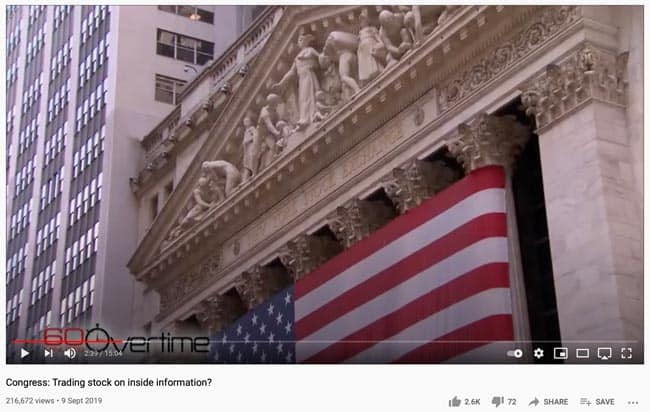
This 2011 documentary made the public aware what the politicians were up to.
In 2012, Congress passed the STOCK Act – Stop Trading on Congressional Knowledge. Effectively, this amounted to Washington, DC, admitting that the system had indeed been rigged in favour of politicians and their personal financial interests. The STOCK Act seemed like the right countermeasure for anyone who wanted to make the system fairer, but subsequent amendments to the bill only made it more difficult to police insider trading by members of Congress. Honi soit qui mal y pense. Again, regulation was more about optics and narratives than about evidence and results. Only, it's just not possible to cover up these things anymore.
Attentive followers of the news will have noticed how in recent times, there have been yet more indications that something is amiss with insider trading regulation and how governments seemingly "level the playing field".
E.g., in March 2020, the Republican Senator Richard Burr of North Carolina sold shares just before the coronavirus crash. He had been given confidential information by Dr. Anthony Fauci and he used it to decide on the sale of his investments. What a nice job, if you can get.
John Kerry, the private jet loving high priest of the climate change persuasion, was recently reported to have had millions invested in stocks of oil companies. He had previously warned that mankind only had nine years to save the planet, and the campaign against fossil fuels had depressed energy stocks. Kerry owned these stocks at a time he was working with climate change organisations, and without a doubt benefitting from the clout bestowed upon him by his previous association with the Obama administration. Did he use his public position to talk down these shares and then pick them up cheaply? The evidence is unclear and there are no immediate legal issues, but the optics are not good.
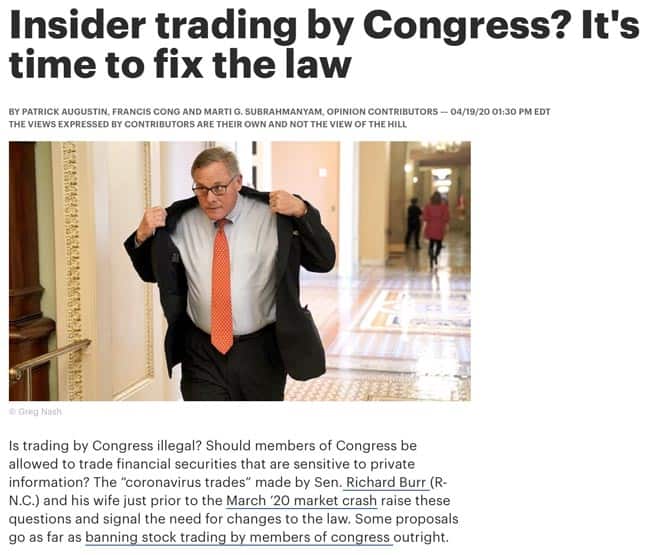
It's 2021 and politicians still get away with it (Politico, 19 April 2021).
Cases such as these contribute to the wider public distrusting institutions and regulations. Evermore people are asking whether much of the regulation we are living under wasn't actually created to benefit political rent seekers, such as the Wall Street firms whose lobbyists inhabit the hallways of Washington, DC.
What all this will likely lead to is a new generation of entrepreneurs and investors building an entirely new financial system, and one that regulators and governments will find difficult, if not impossible, to control.
Bitcoin is a part of that, but just a small one.
A great summary of what may be to come appeared in a recent issue of The Pomp Letter, the daily missive by blockchain expert and venture capitalist, Anthony Pompliano.
With reference to some of the cases mentioned above, he wrote:
"This sort of approach leads to distrust. Putting the interests of the powerful few over everyday people will continue and the loss of faith in our institutions will grow. The most obvious example is the US Federal Reserve printing dollars non-stop to prop up a failing system that does not work for everyone. People are looking for alternatives. Rightfully so.
We are reinventing how stocks are built and traded. We see a world in which situations like the ones involving Robinhood and Gamestop can't happen.
If you want to buy or sell your stock on a Saturday at 3am, you should be able to. … That’s the level of financial freedom and control we want to enable for equity markets.
…
We believe a lot of companies will recognize the value of issuing equity on the blockchain and specifically on a platform like Exodus where people already hold their money.
…
By 2030, we plan to have helped half the world exit the traditional financial system by continuing to build easy-to-use tools that empower people to control their wealth.
…
Our primary competitor is not another company. It is conventional thinking. Old systems are being tested and the cracks within them are widening. We have to thoughtfully approach new problems and think differently. As Steve Jobs aptly stated in an old Apple commercial, 'the people who are crazy enough to think they can change the world are the ones who do'."
Will we soon think differently about insider trading as well?
In the world of crypto-currencies, tokens, non-fungible tokens and similar assets, insider trading is not yet supervised, regulated or criminalised (or if it was, I didn't get the memo). The crypto and blockchain experts that I have spoken to mostly envision a libertarian society where regulation is kept at a minimum, and it'll be up to individuals and companies how they regulate insider trading, if at all.
Will we see a return to the common law being applied to insider trading, as was the case pre-1934?
There is no clarity yet what all these developments will eventually amount to, but it's fascinating to explore them. That's true all the more at a time when talking about much of this still carries a degree of controversiality. Once something is a widely established consensus, it will have been priced in already. You gotta catch a trend early in order to maximise your profit.
Initial thoughts on how to benefit from all this
What you just learned in the course of less than half an hour cost me a week of reading and writing. Still, I am happy that I did finally explore this subject. It is now clear to me that:
- Insider trading regulation is neither fair nor effective, no matter what our overlords tell us.
- This regulation places a burden on companies and societies, and investors are carrying massive costs that eat into their investment returns while benefitting those who are either above the law or brazen enough to ignore the law.
- Some markets will change, loosen or discard their insider trading regulation, in a trend further aided by the rise of new technology.
The question remains, though, how can investors benefit?
Right now, I can see three areas for you to keep an eye on:
1. Building new market places
The 2020s will see the emergence of an alternative financial system. We already got an inkling of the value that can be created by doing so in the crypto-currency and blockchain sector. This is all part of a wider movement of using technology to toss excessive, unnecessary and costly government regulation out the window. Sooner or later, significant parts of current insider trading regulation will be part of that, and there'll be plenty of investment opportunities coming up. The stock of TISE, which I featured last week, certainly deserves a special mention in this context. Markets should place a premium on companies and CEOs who have got the intellectual capacity and the sheer strength to go against established narratives even if that makes you a polarising enterprise. TISE looks like a good candidate in this regard.
2. Investment products managed by insiders
If you could co-invest alongside politicians like John Kerry, wouldn't you want to do it? He has access to inside information, he has the power to manipulate narratives and markets, and he prioritises his personal gain over being perceived as a hypocrite. Much as this may be questionable on a personal level, if you are looking for someone to ruthlessly grow your money, the John Kerrys of this world could be a good place to turn to. Right?
Many asset classes don't have insider trading regulation at all, i.e. it's legal to use insider information for gain. At the same time, it's getting easier and cheaper to create new investment products, including innovative and controversial ones. I believe there will be a new trend of some fund managers actively marketing themselves as insiders of one form or another, and turning that into a selling point for their funds.
Don't believe me?
Watch this space for more reporting. Today's article was intended to prepare the ground for an upcoming missive, which will be a step towards turning the theory behind this article into practice. (And "No", I haven't signed up John Kerry to work for me as fund manager. Even my morals have limits.)
3. Follow conventional insider data
Much as insider trading is heavily regulated, there are still ways for corporate insiders to trade the stock of their own company.
Undervalued-Shares.com regularly looks at stocks where insiders have disclosed significant transactions. If you know how to read these disclosures, there can be valuable information and trading signals hidden between the data points.
In its own limited way, this may currently still be the easiest way to benefit from existing insider trading regulation. Look no further than my current example of Cresud, an Argentinean agriculture company where I had spotted insiders using a creative way for upping their investment. It's up about 40% since I published my in-depth report about it six weeks ago, and insider signals did lead me towards researching the story.
Exploring new shores – and taking my readers along for the ride
I wrote this article as a thought experiment, and to see if I could string together an argument that big changes were afoot in the area of insider trading regulation. I also wanted to explore how one might be able to benefit from it all.
Frankly, I was nervous about publishing this article. It's a complex, controversial subject matter and one that I have only been a cursory student of when compared to some experts who have spent decades (or a lifetime) studying the subject. Putting this piece out there is also an experiment in seeing what ends up in my inbox as a result. Will I have professional contacts disavow they ever knew me? God only knows. As a blogger and wannabe public intellectual, you need to try out stuff that others haven't done yet. This article felt like one of those experiments worth undertaking.
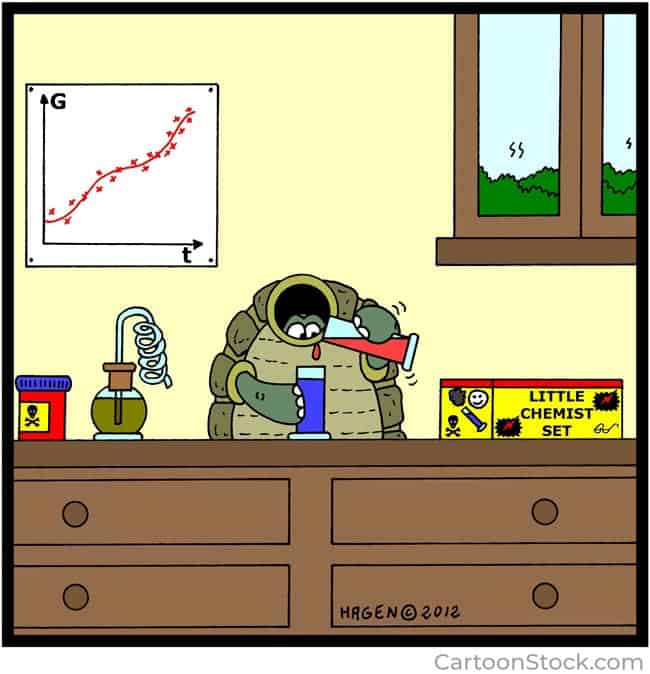
Yours truly posting this article.
As you will have noticed by now, one of my current research interests is how we are currently moving into a bifurcated world - a world where everyone has to decide which part they want to join.
Parts of the world are moving to ever-bigger government, ever-tighter regulation, and (as a result) ever-shrinking freedom. If you live in the EU, you'll be well familiar with the issue. The US, too, seems to be moving into this direction, and rather rapidly. Other, often smaller jurisdictions have spotted their opportunity to move the other way, as covered in my last Weekly Dispatch.
It could be lucrative to study those parts of the world that have started to push back. The world of crypto-currency and blockchain applications is one such part, even if it's widely considered a dangerous Wild West rather than a beacon of individual liberty and economic freedom. I sense there are other trends emerging that tie in with this entire subject, and they deserve more attention.
Readers are welcome to send me their thoughts and observations. I am keen to find less obvious trends, and ways of benefitting from them. At times, this will involve engaging in a bit of lateral thinking and finding roundabout ways to latch onto a trend.
E.g., in some ways, the rapid growth of private equity may also be related to the misguided insider regulation we have lived under for decades. If you buy and sell entire companies on private markets rather than through the stock exchange, then insider regulation doesn't apply to you. Over the past 30 years, the private equity industry has grown from nowhere to commanding about 10% of the global M&A market. At least some of the large private equity players have achieved outstanding returns for their investors. Was that the case because private equity giants are able to legally use insider information? I recently featured the leading private equity firm, Apollo Global Management, in an in-depth report for my Members. Their founders had worked closely with Michael Milken, who at the time made for the highest-profile ever insider trading conviction. I find these seemingly coincidental overlaps a tantalising research question. Has the stock of Apollo Global been a tool to benefit from misguided insider trading regulation and the lack thereof in private M&A transactions?
What can we learn from all this, and which conclusions should we draw with regards to our own investment decisions?
If private equity investors, blockchain entrepreneurs, real estate investors and commodities traders can make use of inside information, shouldn't we find ways (and create financial products) that allow us to specifically benefit from their legal use of insider information?
I don't claim to have definitive answers for any of the above, and there are lots of counter-arguments available for any of what I write above.
However, it's a fascinating subject to delve into, and the scientific, economic and societal debate isn't nearly as settled as many claim. To use the lingo that the mainstream media and government-funded academia like to use when dealing with inconvenient hecklers, you could say I am an insider trading denier. Luckily, throwing labels at me doesn't stop me from exploring the subject, but only fuels my desire to further look into seemingly settled science.
Given how we all strive to make a buck in the market (else you wouldn't be on my website), there is also a serious question whether we shouldn't venture beyond publicly-listed equities and instead strive to gain insider knowledge in markets where we can freely and legally put it to use (i.e., anywhere but publicly-listed securities).
There are so many questions related to all this.
Prof. Manne has spent a lifetime arguing for legalising inside trading, and he was certainly no muppet. During the latter part of his life, he was the dean and professor emeritus at George Mason University School of Law in Arlington, Virginia. I love finding and reading books from people who were simply ahead of their time, and who weren't afraid of speaking out. He certainly was "bold", but in a good way.
Trying to legislate against insider trading could one day be compared to previous efforts such as trying to legislate against "sins" including consuming alcohol or having hanky-panky outside marriage. These, too, were once the target of legislation that government brought in on the back of "moral". Interpretations of morals and ethics change over time, in business and elsewhere. Yesterday's moral outrage often turns out to be tomorrow's societal norm.
Will the world look at insider trading regulation one day and find it as silly as we now feel about prohibition?
With Big Government now getting completely out of control in some parts of the world, and other parts of the world increasingly recognising the value (and necessity) of pushing back, I can sense there'll be a renewed debate about this at some point.
When it happens, Prof. Manne's landmark publication should still stand tall as the definitive and most historically relevant book ever written about the subject. You'll struggle to find an academic article about insider trading that doesn't make reference to his book. A wider public debate about this topic could make the current book price of USD 100 to USD 150 go a lot higher.
When I featured a similarly unknown but rare book – the biography of Adolf Lundin – its price subsequently shot from USD 100 to USD 1,000. In recent years, thanks to the growing popularity of investing, various out-of-print books written by well-known stars of the investment industry have become collector's items. E.g., try finding a copy of Seth Klarman's book on value investing for less than USD 1,000 nowadays – good luck!
With Prof. Manne's work, a wider public debate about insider trading could make this book's price go a lot higher even. If you have any interest in insider trading or enjoy owning books that go up in value, I'd recommend you buy a copy soon.
That's one inside trade for you, in an alternative asset class where you are legally entitled to act on it!
Did you find this article useful and enjoyable? If you want to read my next articles right when they come out, please sign up to my email list.
Share this post:
Is CRESUD about to stage a rally?
Something's afoot at CRESUD, the Argentinean agriculture and real estate company that I recently flagged to Undervalued-Shares.com Members. On Thursday, its stock price made a noticeable jump, from USD 5.70 to as high as USD 6.11.
This was much more than a normal day's volatility.
Has the time come to latch onto this opportunity?
If you haven't taken a closer look at my research report already, now would probably be a good moment to do so...








